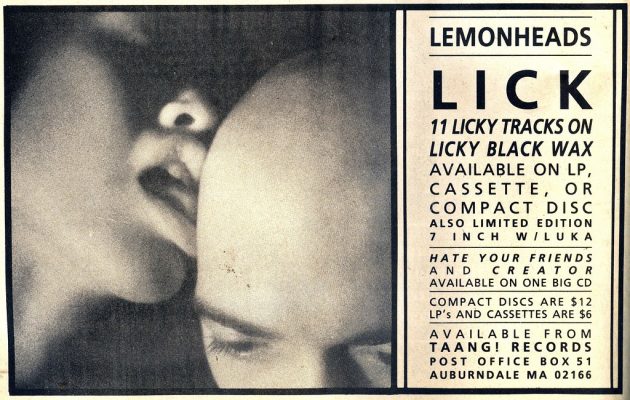Punk in the Beerlight: Mike Krol vs. the Lemonheads
Originally posted on May 20, 2019 at 0:01 am by Evan RobinsonBy Evan Robinson
Editor’s note: Mountain bikes weren’t the only thing ahead of their time and right on schedule in 1989. While Dirt Rag was being cut-and-pasted in Maurice Tierney’s living room, other wing nuts and artists were also toiling away at their own masterpieces. Many of those albums have stood the test of time to such a degree that music now, while being completely original, comes across more like homage. We pay tribute to all of it in this column, Punk in the Beerlight, written by Pittsburgh’s resident punk rocker/bike shop owner, Evan “Soupie” Robinson.
Mike Krol, “Power Chords”

Somehow, in the year 2019, feelings of inadequacy, depression about relationships and a general sense of longing have not been cured by modern medicine. I keep buying bikes, and that helps, but I continually reach for music. In my younger days, I could ride my BMX bike to the woods, listen to Weezer’s Blue Album on compact disc, drink Turner’s iced tea and settle into being an angsty teen. Since Weezer’s new album sounds like a corporate rebrand using recycled parts of newer Daft Punk and Vampire Weekend to sell downloads to Gen Xers, I’ve been very pleased with Mike Krol’s “Power Chords.”
With warm, fuzzy, feedbacking guitar, Krol starts the album speaking the words, “I used to never understand the blues until the night I met you. Just every day since, I’ve gotten better at guitar.” The themes of “Power Chords” are not new, nor is the sad pop/garage formula. Krol’s voice tonally evokes the tongue-in-cheek, self-deprecating sound of somebody who has been beaten up (just like he appears on the album cover) in a way that has happened before and will inevitably happen again. What makes this well-known take on melodrama really work for this album is how sharp and on-beat the drumming is and how driving the band is as a whole. The contrast of the lyrics being almost whined into the microphone with a drawl coupled with how tight the band is strikes a wonderful balance that carries through to the end of the album — no song drags.
I’ve been listening to this album song by song and have added some of the exceptional bangers to playlists. The three snare hits that open “An Ambulance,” followed by the guitars mocking a siren, immediately pull me in. “I think better when you’re in town,” he sings, “and I look much better when I’m not laying facedown on the ground.” Self-care starts at not laying facedown on the ground, for sure.
Hot tracks: “An Ambulance,” “Arrow in My Heart,” “Wasted Memory”
The Lemonheads, “Lick”

From the depths of 1989 comes another transitional album. Frontman Evan Dando may have been one of People Magazine’s 50 Most Beautiful People in 1993, but before the ’90s grunge/alt limelight consumed him, the Lemonheads were hovering on the more emo side of punk. “Lick” shows many of the moving parts of what the Lemonheads were, and almost obscures what they were going to be.
“Lick” has a full run of sounds at play. The opening track, “Mallo Cup,” which is practically an REM song at the intro, fuzzes into a faster, almost snotty “Glad I Don’t Know.” By the time you hit the fourth track, the mood gets downright reflective. The scatterplot of sounds makes me want to compare “Lick” to efforts by bands like Rites of Spring, but there is a sourness and juvenile feel that makes the comparison not quite land. Songs like “Sad Girl,” “I Am a Rabbit” and the Suzanne Vega cover, “Luka,” show the underdeveloped and less-mature qualities of this album. But they are supposed to feel fun and they do.
Part of the transitional feel comes from this being founding guitarist Ben Deily’s last album with the band. The songs “7 Powers,” “Ever” and “Anyway” could have been early Goo Goo Dolls songs, equal parts jangly, sad and trite in an endearing way. All of these elements not only make this difficult to review as an album, but also make the trajectory of the Lemonheads to their 1992 release “It’s a Shame About Ray” seem much farther away than three years. There are lyrical plays that are similar to what you would expect from later Evan Dando works, but not yet distinguished. The reason to highlight this album is that the hot tracks are hot; it just doesn’t quite hit as a unit. Throw “Luka” or “Mallo Cup” on a mix you make for someone and you will see what I mean.